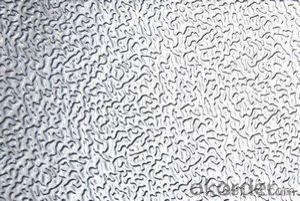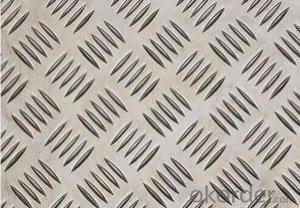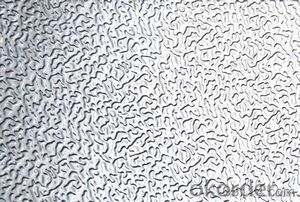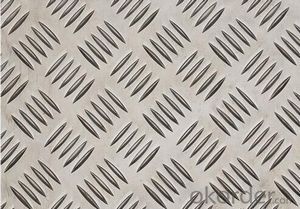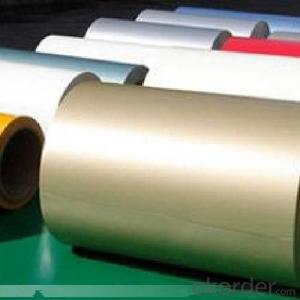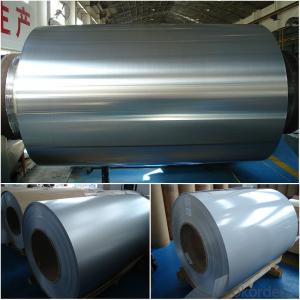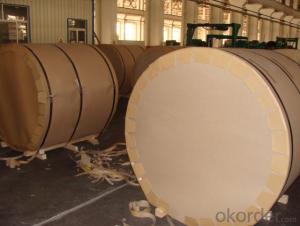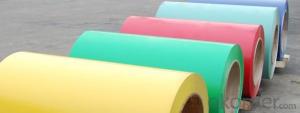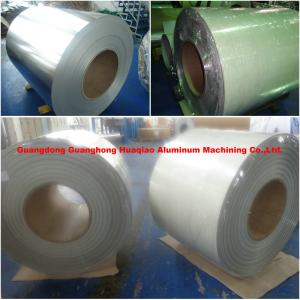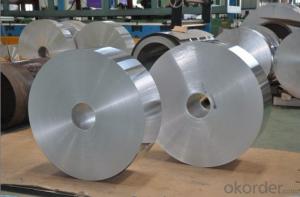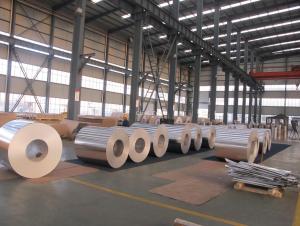Checker China Black Aluminum Coil
- Loading Port:
- China Main Port
- Payment Terms:
- TT OR LC
- Min Order Qty:
- -
- Supply Capability:
- -
OKorder Service Pledge
Quality Product, Order Online Tracking, Timely Delivery
OKorder Financial Service
Credit Rating, Credit Services, Credit Purchasing
You Might Also Like
supply Mill-finished / coated aluminum plate/sheet/ coil:
Alloy: AA1050,1060,1100,1200,2024,3003,3304,3005,3015,5052,5086,5754,5083,6061,7050,7475,8011, etc
Temper: O, H14/16/18/22/24/32/ H112/H321/T6,T851,T7451,T7351, etc
Thickness: 0.02mm—20mm
Width: 100mm—2000mm (Can be slitted)
Notice: PE coating / PVDF coating / Embossment can be done if required.
- Q: Can aluminum coils be used in cryogenic applications?
- Yes, aluminum coils can be used in cryogenic applications. Aluminum is known for its excellent thermal conductivity, which makes it a suitable material for transferring heat in low-temperature environments. Additionally, aluminum has a low coefficient of thermal expansion, meaning it can withstand the extreme temperature changes that occur in cryogenic applications without experiencing significant dimensional changes. However, it is worth noting that aluminum coils may need to be specially designed or treated to ensure they can withstand the extremely low temperatures and avoid any potential issues such as brittleness or embrittlement.
- Q: What is the typical price gap between purchasing new aluminum coils versus used ones?
- <p>The price difference between new and used aluminum coils can vary significantly based on factors such as the quality of the used coils, market demand, and the specific grade of aluminum. On average, used aluminum coils can be 20-50% cheaper than new ones. However, this is a broad estimate and actual prices can fluctuate. It's essential to check current market prices and consider the condition of the used coils before making a purchase decision.</p>
- Q: What is the maximum length of aluminum coils?
- The maximum length of aluminum coils can vary depending on factors such as the type and thickness of the aluminum, the manufacturing process, and transportation limitations. Typically, aluminum coils can range from a few hundred feet to several thousand feet in length.
- Q: Can aluminum coils be used in the manufacturing of beverage cans?
- Yes, aluminum coils can be used in the manufacturing of beverage cans. Aluminum coils are commonly used in the production of beverage cans due to their lightweight, corrosion-resistant, and malleable properties. These coils are processed and shaped into cans during the manufacturing process, providing a durable and cost-effective solution for packaging beverages.
- Q: Is it possible to use an aluminum coil for cooking rice?
- <p>While it is technically possible to use an aluminum coil to cook rice, it is not recommended due to potential health risks. Aluminum can leach into food, especially when heated, and long-term exposure to aluminum may have adverse effects on health. Instead, use materials like stainless steel, cast iron, or non-stick cookware specifically designed for cooking rice to ensure safety and better results.</p>
- Q: What are the maintenance requirements for aluminum coils?
- To ensure optimal performance and longevity, aluminum coils require regular cleaning and inspection. It is recommended to clean the coils at least once a year, or more frequently in areas with high pollution or corrosive environments. Use a mild detergent or coil cleaner along with a soft brush or cloth to remove any accumulated dirt, dust, or debris from the coils' surface. Regular inspection is also crucial to identify any signs of damage, corrosion, or leakage. Bent fins, dents, or corrosion should be promptly addressed to prevent further harm and maintain coil efficiency. If there are any indications of leakage, it is essential to have a professional technician inspect and repair the coils to prevent potential refrigerant leaks. Additionally, it is advisable to keep the area around the coils clean and free from obstructions that may hinder airflow, such as leaves, plants, or debris. This will ensure proper airflow and prevent the coils from overworking, which can result in inefficiency and possible damage. In conclusion, maintaining aluminum coils involves regular cleaning, inspection for damage, corrosion, or leakage, and keeping the surrounding area clear for optimal performance and longevity. By following these maintenance practices, you can ensure the efficient functioning of the aluminum coils and extend their lifespan.
- Q: I am writing a science-fiction story, and I am planning on making Aluminum this ultra-valuable element (Which adds irony - Aluminum is the third most abundant element on Earth!) Even if ol' atomic no. 13 is as common throughout the universe as it is on Earth, I can bring up 'multiverse' to get away with it. I think it'd still be nice to know.
- Interesting, the aluminum must flow? Aluminum is not as common as other elements. It is not readily produced in the cores of stars through the alpha-capture process (which produces things like carbon, oxygen, neon, magnesium, silicon, etc.). This means it is only produced via supernova explosions. The table in Wikipedia (see link below) will give you an idea of the relative abundance to other elements. (Notice that magnesium and silicon, which are before and after aluminum, are nearly 100 times more abundant). As a fellow, Sci-Fi enthusiast, I'd remind you to make you're story believable. If you decide that your universe won't have supernovae, remember that would mean there would be no iron, gold, uranium, etc. My answer has been long enough, but I'm sure you have an idea why aluminum is so abundant on the Earth's crust so I'll stop here.
- Q: What are the common safety precautions when working with aluminum coils?
- When working with aluminum coils, it is important to follow several safety precautions to ensure the well-being of individuals and prevent accidents. Some common safety precautions when working with aluminum coils include: 1. Personal Protective Equipment (PPE): Always wear appropriate PPE such as safety goggles, gloves, and aprons when handling aluminum coils. This protective gear helps protect against potential injury from sharp edges, cuts, or burns. 2. Proper Handling Techniques: Use proper lifting techniques to avoid strain or injury. Aluminum coils can be heavy, so it is essential to lift with your legs, not your back, and use lifting aids or equipment if necessary. 3. Secure Storage: Store aluminum coils securely to prevent them from falling or rolling. Avoid stacking coils too high to prevent them from toppling over and causing injuries. 4. Proper Ventilation: Ensure that the work area has adequate ventilation to prevent the buildup of fumes or dust particles. Aluminum coils may release harmful particles or gases when cut or processed, so proper ventilation is crucial for maintaining a safe working environment. 5. Fire Safety: Aluminum is highly flammable, so it is vital to prevent sparks or open flames near aluminum coils. Use non-sparking tools and avoid smoking or using flammable materials in the vicinity. 6. Sharp Edges: Be cautious of sharp edges on aluminum coils, as they can cause cuts or lacerations. Handle coils with care and use appropriate tools to mitigate the risk of injury. 7. Training and Safety Guidelines: Ensure that all personnel working with aluminum coils are properly trained in handling procedures and safety guidelines. This includes understanding the correct use of equipment, emergency procedures, and knowledge of any specific hazards associated with aluminum coil handling. 8. Regular Maintenance: Maintain equipment and tools regularly to ensure they are in good working condition. This includes inspecting and repairing any damaged or worn-out parts that could pose a safety risk. 9. First Aid and Emergency Response: Keep a well-equipped first aid kit nearby and ensure that employees are aware of its location. In addition, establish clear emergency response protocols and train employees on what to do in case of an accident or injury. By adhering to these common safety precautions, individuals can minimize the risks associated with working with aluminum coils and create a safer working environment.
- Q: Describe the different methods used to produce aluminum coils.
- <p>Aluminum coil is produced through several methods, primarily involving the process of rolling. The main methods include: 1) Hot rolling, where aluminum slabs are heated and rolled into coils at high temperatures. 2) Cold rolling, which involves rolling aluminum at room temperature to achieve thinner gauges with higher precision. 3) Continuous casting and rolling, a process where aluminum is cast and rolled in one continuous operation, optimizing production efficiency. 4) Twin-roll casting, a method where molten aluminum is cast directly between two counter-rotating rolls, forming a thin strip that can be coiled immediately. Each method has its advantages and is chosen based on the desired coil properties, thickness, and application.</p>
- Q: How do aluminum coils perform in extreme temperatures?
- Aluminum coils display remarkable performance in extreme temperatures, renowned for their ability to endure high heat without melting or deforming. This is due to aluminum's low melting point of 660°C (1220°F), which sets it apart from other metals. Consequently, aluminum coils are highly sought-after in industries such as automotive, aerospace, and HVAC, where heat resistance is paramount. In addition to excelling in extreme heat, aluminum coils also exhibit exceptional performance in freezing temperatures. This is attributed to aluminum's exceptional thermal conductivity, enabling it to efficiently transfer heat. As a result, even in frigid conditions, aluminum coils can promptly warm up and maintain a consistent temperature. Furthermore, aluminum's resistance to corrosion renders it an ideal choice for outdoor applications exposed to harsh weather conditions. Unlike other materials, aluminum does not rust or deteriorate when exposed to extreme temperatures, ensuring its durability and reliability. In conclusion, aluminum coils are specifically designed to withstand extreme temperatures, making them the preferred option for industries that prioritize heat resistance and long-lasting performance.
Send your message to us
Checker China Black Aluminum Coil
- Loading Port:
- China Main Port
- Payment Terms:
- TT OR LC
- Min Order Qty:
- -
- Supply Capability:
- -
OKorder Service Pledge
Quality Product, Order Online Tracking, Timely Delivery
OKorder Financial Service
Credit Rating, Credit Services, Credit Purchasing
Similar products
Hot products
Hot Searches
Related keywords
